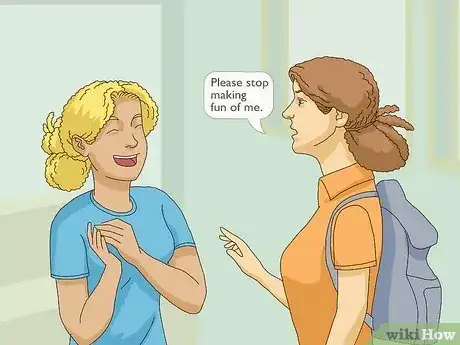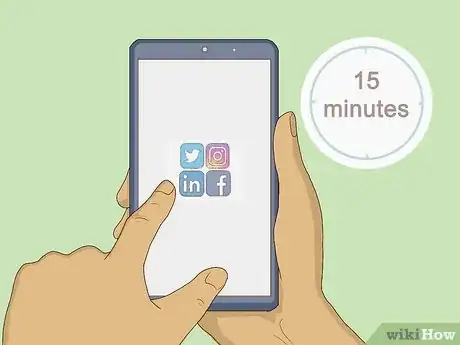This article was co-authored by Katie Styzek. Katie Styzek is a Professional School Counselor for Chicago Public Schools. Katie earned a BS in Elementary Education with a Concentration in Mathematics from the University of Illinois at Urbana-Champaign. She served as a middle school mathematics, science, and social studies teacher for three years prior to becoming a counselor. She holds a Master of Education (M.Ed.) in School Counseling from DePaul University and an MA in Educational Leadership from Northeastern Illinois University. Katie holds an Illinois School Counselor Endorsement License (Type 73 Service Personnel), an Illinois Principal License (formerly Type 75), and an Illinois Elementary Education Teaching License (Type 03, K – 9). She is also Nationally Board Certified in School Counseling from the National Board for Professional Teaching Standards.
There are 8 references cited in this article, which can be found at the bottom of the page.
This article has been viewed 61,932 times.
Drama at school stinks. You have to see the same people all of the time, so what do you do when someone is stirring up problems and won’t leave you alone? By choosing good company, avoiding gossip, and being able to tell when enough is enough, you can limit the amount of drama that you face at school.
Steps
Choosing Good Company
-
1Avoid negative or dramatic people. They are always complaining about something, and that’s not nice or fair. Don’t make eye contact, respond with words or actions, or give any clue that you heard what they said. This may cause this person to go around bad-mouthing you, but remember that you don’t want those negative people in your life anyway.
-
2Skip the clique. Cliques are small, well-known social groups that don’t allow new members very often, and they tend to start a lot of the drama at school with bullying and gossip.[1] Even though it might seem cool to be in the most exclusive group in school, don’t try to get into a clique that already exists. They’ll probably see you as the new target for their bullying.
- Form your own unique friend groups by finding people in a club or activity who have similar interests as you. Always be open to new members.
Advertisement -
3Be intolerant of hurtful behavior. If someone does something wrong, try to open your mind and think about their intentions before judging them. If they were truly wrong, that person might not be a good friend to you in the future.[2]
- If a friend laughs at you, you could say "Please stop making fun of me. You're really hurting my feelings."[3]
-
4Cut out mean people. Mean people make your problems about themselves, demand your attention, and don't support you when you need it. If someone causes you more hurt than happiness, there’s no shame in saying, “I don’t think we should be friends anymore.” They might get upset, but remember that your health and happiness should be your main concern.[4]
- Mean people also make fun of your body or clothing, knock books out of your hand, pressure people to do what they want even if they say no, and talk back to teachers. These are not qualities you want in a friend.
-
5Have an escape plan for difficult situations. If someone can’t take the hint that you’re not interested in being involved, give a polite but firm excuse and leave. “I’m sorry, I have to go” will usually work. If you’re stuck with that person in a class or activity, say “I would like to get back to my work now.” Repeat this as often as necessary.
Steering Clear of Gossip
-
1Don’t spread gossip. If you hear something about someone, don’t tell it to other people since it might not even be true in the first place.[5] The truth might also change from one retelling of the story to the next, so you can’t know for certain if your information is correct. Even if it’s fun to talk badly about other people while they’re not there, you wouldn’t want someone doing that to you.
-
2Say how you really feel when someone tries to gossip with you. If someone asks you directly if you know anything about a rumor, say “I don’t like spreading rumors” and change the subject.
- Honesty is always the best policy. You can be polite when answering tough questions, but lying will cause you more problems in the long run.[6]
-
3Keep information to yourself when it was told to you in confidence. People could be hurt if you tell a secret you weren’t supposed to tell. Always treat people the way you want to be treated.
- If someone tells you something that puts them or other people in danger, don't keep quiet about it even if it could ruin your friendship. Tell a counselor, teacher, or parent right away so that they can get help.
-
4Stay calm if someone is being mean to you. Use a calm voice and pleasant demeanor instead of making faces, cursing, or otherwise copying emotions. If you are asked to get involved in a situation, be unavailable without giving a distinct reason. You can say, “Sorry, I don’t really have time to do that right now.” Stay neutral, and don’t reveal that you think their idea is a bad one.
-
5Refuse to answer questions that don’t concern the other person. For example, if you choose to move to a different math class, don’t defend your decision to the people questioning you. It’s really none of their business! Offer a vague response like “I just wanted to” if people ask you your reasons for doing something.[7]
-
6Change up your routine. At lunch, sit with a new person or by yourself instead of with the group of problem people. If they see you distancing yourself from all of the tension, they might want to as well.
Lying Low
-
1Think carefully before you speak or act. Drama can be worsened by overreactions and impulsivity. If someone does something to upset you, take a few deep breaths and consider their position before you respond. Before you say something you might regret, ask yourself:
- “Would I be acting this way if my life were less stressful than it is right now?”
- ”Would that person do the same thing to me even if I asked them not to?”
-
2Vent to friends and family members who don’t have ties to your school. Outside friends, parents, and family members can help you see the situation for what it is. They also will have your back if you need help with a problem, so lean into other people in your life that you can trust.[8]
-
3Use social media sparingly. Keep your feed positive and uplifting.[9] Don’t overshare about sensitive topics like religion or politics, as those can get people angry. Remember that you don’t have to post every thought you have.[10]
- Don't participate in any drama on social media, either. Engaging back and forth with people rarely makes things better.[11]
Community Q&A
-
QuestionWhy is gossip toxic?
 Katie StyzekKatie Styzek is a Professional School Counselor for Chicago Public Schools. Katie earned a BS in Elementary Education with a Concentration in Mathematics from the University of Illinois at Urbana-Champaign. She served as a middle school mathematics, science, and social studies teacher for three years prior to becoming a counselor. She holds a Master of Education (M.Ed.) in School Counseling from DePaul University and an MA in Educational Leadership from Northeastern Illinois University. Katie holds an Illinois School Counselor Endorsement License (Type 73 Service Personnel), an Illinois Principal License (formerly Type 75), and an Illinois Elementary Education Teaching License (Type 03, K – 9). She is also Nationally Board Certified in School Counseling from the National Board for Professional Teaching Standards.
Katie StyzekKatie Styzek is a Professional School Counselor for Chicago Public Schools. Katie earned a BS in Elementary Education with a Concentration in Mathematics from the University of Illinois at Urbana-Champaign. She served as a middle school mathematics, science, and social studies teacher for three years prior to becoming a counselor. She holds a Master of Education (M.Ed.) in School Counseling from DePaul University and an MA in Educational Leadership from Northeastern Illinois University. Katie holds an Illinois School Counselor Endorsement License (Type 73 Service Personnel), an Illinois Principal License (formerly Type 75), and an Illinois Elementary Education Teaching License (Type 03, K – 9). She is also Nationally Board Certified in School Counseling from the National Board for Professional Teaching Standards.
Professional School Counselor Gossip can spread hurtful information that may not be true, which can ruin friendships and relationships.
Gossip can spread hurtful information that may not be true, which can ruin friendships and relationships. -
QuestionHow do students cope with drama and stress?
 Katie StyzekKatie Styzek is a Professional School Counselor for Chicago Public Schools. Katie earned a BS in Elementary Education with a Concentration in Mathematics from the University of Illinois at Urbana-Champaign. She served as a middle school mathematics, science, and social studies teacher for three years prior to becoming a counselor. She holds a Master of Education (M.Ed.) in School Counseling from DePaul University and an MA in Educational Leadership from Northeastern Illinois University. Katie holds an Illinois School Counselor Endorsement License (Type 73 Service Personnel), an Illinois Principal License (formerly Type 75), and an Illinois Elementary Education Teaching License (Type 03, K – 9). She is also Nationally Board Certified in School Counseling from the National Board for Professional Teaching Standards.
Katie StyzekKatie Styzek is a Professional School Counselor for Chicago Public Schools. Katie earned a BS in Elementary Education with a Concentration in Mathematics from the University of Illinois at Urbana-Champaign. She served as a middle school mathematics, science, and social studies teacher for three years prior to becoming a counselor. She holds a Master of Education (M.Ed.) in School Counseling from DePaul University and an MA in Educational Leadership from Northeastern Illinois University. Katie holds an Illinois School Counselor Endorsement License (Type 73 Service Personnel), an Illinois Principal License (formerly Type 75), and an Illinois Elementary Education Teaching License (Type 03, K – 9). She is also Nationally Board Certified in School Counseling from the National Board for Professional Teaching Standards.
Professional School Counselor Take a relaxing shower, go for a walk, talk to a trusted adult, or write down your feelings if you're stressed and upset.
Take a relaxing shower, go for a walk, talk to a trusted adult, or write down your feelings if you're stressed and upset.
References
- ↑ https://www.merriam-webster.com/dictionary/clique
- ↑ http://nypost.com/2017/03/22/how-to-avoid-friend-drama/
- ↑ Katie Styzek. Professional School Counselor. Expert Interview. 26 March 2021.
- ↑ http://mentalfloss.com/article/93521/7-tips-eliminating-toxic-people-your-life
- ↑ Katie Styzek. Professional School Counselor. Expert Interview. 26 March 2021.
- ↑ https://www.becomingminimalist.com/why-honesty-is-the-best-policy-for-simplicity/
- ↑ http://outofthefog.website/what-to-do-2/2015/12/3/medium-chill
- ↑ https://www.themuse.com/advice/6-basic-rules-you-need-to-follow-if-you-truly-want-to-avoid-office-drama
- ↑ Katie Styzek. Professional School Counselor. Expert Interview. 26 March 2021.
- ↑ https://www.fastcompany.com/3029019/the-social-media-frequency-guide-how-often-to-post-to-facebook-twitter-linkedin-a
- ↑ Katie Styzek. Professional School Counselor. Expert Interview. 26 March 2021.
































































